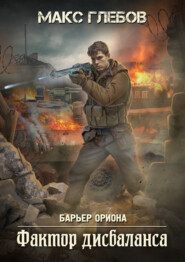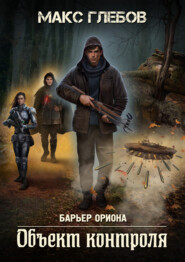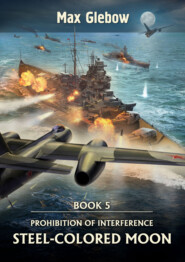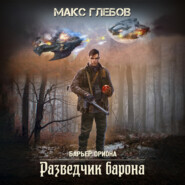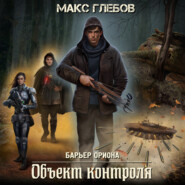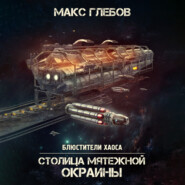По всем вопросам обращайтесь на: info@litportal.ru
(©) 2003-2024.
✖
Prohibition of Interference. Book 4. Asymmetric response
Настройки чтения
Размер шрифта
Высота строк
Поля
He commanded the Feldwebel: “Get on the armor,” and the chemists climbed onto the tank while the crew took their places. Everyone put on their gas masks in advance, as the contaminated terrain began a couple of hundred meters from their position.
This was not the first raid of this kind by Kurt. It seems that Kleist's tanks were indeed approaching the inner front of the encirclement, and the command was actively preparing to strike towards them, trying to find relatively safe corridors to break through. The armies caught in the pocket had practically no means of decontamination, and now they had only to look for gaps in the chemical barriers put up by the Russians.
The tank roared its engine and, scattering snow, moved in the direction indicated by the chemists. In Kurt's opinion, an armored personnel carrier would have been better suited for this task, but there were even fewer armored personnel carriers in the surrounded troops than there were tanks, and besides, the chance of encountering enemy fire was still quite high. In general, the command chose not to take the risk, although for soldiers forced to sit on the armor, this decision was clearly not to their liking.
Within a couple of hours, the chemists stopped the tank three times by tapping on the armor and went to the neutral zone. The distance to the Russian trenches remained quite long – the Reds did not want to go into territory that they themselves had flooded with mustard gas. As Knispel realized, the chemists were trying to determine the width of this contaminated zone. Two of them were carrying rather cumbersome chemical reconnaissance equipment. The situation was complicated by the fact that in the event of shelling the soldiers could not lie down in contaminated territory – the snow and soil, soaked with poison, could kill them more surely than a bullet or a shrapnel. Therefore, the chemists were in no hurry to approach the Russian trenches, and they had no such task.
Each time he returned to the tank, the Feldwebel only shook his head in the negative and his subordinates climbed onto the armor in silence, while the Lieutenant gave the driver the order to move on.
The fourth time was more successful. Anyway, the chemist squad went quite far and didn't get back until about 40 minutes later. Before that, it took them 10–15 minutes to realize that there were no passages accessible to infantry in the places they were checking.
“We found a way through,” muttered the Feldwebel from under his gas mask, “I won't say the gap is wide, but with minimal decontamination the infantry will pass. The Russian artillerymen must have made a mistake and shifted their sights. The place is undoubtedly promising…”
“Air!” Kurt yelled as he saw the dark dots of planes on the horizon.
“Maybe it's our planes?” The Feldwebel uncertainly suggested, trying to see details through the glasses of his gas mask, which were beginning to mist up.
No one answered him. The tank, located under the trees of a small grove, had a good chance of remaining unnoticed, and the Lieutenant quite rightly decided not to move and wait for the situation to become clearer. The planes, whoever they were, clearly didn't come here because of them.
“It's the Russian attack planes,” one of the chemists identified the enemy, “They're flying to the left, and they don't seem to see us.”
Suddenly, behind the ILs, two more dots emerged from the high clouds and rushed down in a steep dive.
“And these are ours,” said the Feldwebel with satisfaction; he had managed to remove the gas mask from his face and now, without taking off his gloves, was wiping it with a damp-looking piece of cloth. His subordinates immediately followed his example – it seemed that the reconnaissance was over for the day.
The attack by the Messerschmitts did not go unnoticed. Tracks of machine-gun bursts stretched from the attack planes toward them, but the Russians did not appear to be able to get any hits. But the Germans did not miss their chance. The IL-2, slightly behind the group, ceased fire. A few flashes flickered across its hull, and the plane slowly tipped onto its wing. Shrouded in smoke, it quickly hurtled toward the ground, but suddenly a wide white trail stretched behind the doomed plane.
“Gas!” yelled the Feldwebel, pulling back his gas mask, which he had almost put away.
The pilot of the downed attack aircraft was apparently still alive and opened the nozzles of the airborne spray device. Half a ton of mustard gas mixed with hard-to-freeze solvents formed a huge cloud behind the plane within seconds, which was now spreading wider and wider and drifting toward the grove where Kurt's tank had taken cover.
“Start the engine!” Lieutenant Klein shouted as he fell inside the tank and slammed the hatch doors.
In the sky, meanwhile, there were new actors – two Yak-1 fighters. It was unclear why they fell behind the attack aircraft they were covering, but now the Russian pilots were trying to come to the aid of their comrades.
How the battle ended, Kurt did not see, and only when he returned to his unit did he witness a brief conversation between the tank commander and the chemist Feldwebel.
“We barely had time to get out of there, or else you and I, Herr Lieutenant, would have had to scrub your tank of mustard gas and treat each other with this stinking crap from the anti-chemical bags. None of us have full hazmat suits.”
“Well, then, this time we were lucky,” the Lieutenant took the chemist's words calmly. “How did it end in the air?”
“The Messerschmitts took down another attack plane, and I didn't see any more. Worse is another thing. These Russians seemed to be flying in to spray our trenches with chemicals, and when the M-109s came at them, they started to get rid of the stuff by opening the airborne spray devices.”
“What's wrong with that?” The Lieutenant was flaccidly surprised. “Since they didn't deliver the chemical contamination to our trenches, the infantrymen must deliver a case of schnapps to the fighters.”
“This victory for the Luftwaffe is going to cost us,” the Feldwebel grinned angrily. “The Russian attack planes completely flooded the corridor we scouted with mustard gas. So get ready, Herr Lieutenant. Tomorrow, or maybe even today, the command will drive us again to the raid.”
* * *
My modest wish to reinforce the two tank brigades assigned to me with chemical defense units was granted by the Headquarters of the Supreme High Command with an unexpected vast sweep.
Shaposhnikov decided not to be penny wise, and each of the brigades received two separate chemical defense battalions from the General Command's reserve, with all the units and equipment due to them – decontamination vehicles, decontamination units for clothing and equipment, chemical reconnaissance platoons and combat support companies.
“Comrade Marshal, I got everything I needed in terms of anti-chemical protection. Thank you for your understanding. Nevertheless, this is not enough for the success of the operation,” I decided that if they give it to me, I should take everything my grasping hands could reach, “The enemy will quickly see what our counterstrike can lead to and will counter it fiercely. In particular, the Germans would certainly launch air and artillery strikes against the chemical defense battalions, which will be busy decontaminating the passages for Comrade Konev's armies. I must be able to counteract these attempts effectively. The regular air defense capabilities of tank brigades are totally inadequate to cover the advancing tanks and protect the chemists at the same time.”
“All right,” Shaposhnikov agreed after a little hesitation, “we'll solve this problem. Anything else?”
“Artillery. I need the ability to quickly organize a counter-battery fight when the German heavy howitzers start shelling our battle lines. Ideally, I would like to have a direct link with the artillery regiment of the Reserve of the Supreme High Command, which will work on the coordinates transmitted by me. It would be better to have two regiments.”
“It's doable,” nodded the Marshal, “especially since this scheme has proven itself more than once in real combat. But things are worse with ammunition. Large-caliber high-explosive shells are almost non-existent even in the front-line depots.”
“Comrade Marshal, chemical munitions would be excellent for counter-battery warfare. Mustard gas and lewisite quickly discourage artillerymen from continuing to fire, especially if one high-explosive round in every five or six chemical rounds still lands on their positions.”
“You're not a supporter of the use of poisonous substances, are you, Lieutenant Colonel?" grinned Shaposhnikov.
“I'm not. But I'm not a stubborn idealist. If there's no other way out, we'll use what we have. At least until the asymmetric response is ready.”
This was not the first raid of this kind by Kurt. It seems that Kleist's tanks were indeed approaching the inner front of the encirclement, and the command was actively preparing to strike towards them, trying to find relatively safe corridors to break through. The armies caught in the pocket had practically no means of decontamination, and now they had only to look for gaps in the chemical barriers put up by the Russians.
The tank roared its engine and, scattering snow, moved in the direction indicated by the chemists. In Kurt's opinion, an armored personnel carrier would have been better suited for this task, but there were even fewer armored personnel carriers in the surrounded troops than there were tanks, and besides, the chance of encountering enemy fire was still quite high. In general, the command chose not to take the risk, although for soldiers forced to sit on the armor, this decision was clearly not to their liking.
Within a couple of hours, the chemists stopped the tank three times by tapping on the armor and went to the neutral zone. The distance to the Russian trenches remained quite long – the Reds did not want to go into territory that they themselves had flooded with mustard gas. As Knispel realized, the chemists were trying to determine the width of this contaminated zone. Two of them were carrying rather cumbersome chemical reconnaissance equipment. The situation was complicated by the fact that in the event of shelling the soldiers could not lie down in contaminated territory – the snow and soil, soaked with poison, could kill them more surely than a bullet or a shrapnel. Therefore, the chemists were in no hurry to approach the Russian trenches, and they had no such task.
Each time he returned to the tank, the Feldwebel only shook his head in the negative and his subordinates climbed onto the armor in silence, while the Lieutenant gave the driver the order to move on.
The fourth time was more successful. Anyway, the chemist squad went quite far and didn't get back until about 40 minutes later. Before that, it took them 10–15 minutes to realize that there were no passages accessible to infantry in the places they were checking.
“We found a way through,” muttered the Feldwebel from under his gas mask, “I won't say the gap is wide, but with minimal decontamination the infantry will pass. The Russian artillerymen must have made a mistake and shifted their sights. The place is undoubtedly promising…”
“Air!” Kurt yelled as he saw the dark dots of planes on the horizon.
“Maybe it's our planes?” The Feldwebel uncertainly suggested, trying to see details through the glasses of his gas mask, which were beginning to mist up.
No one answered him. The tank, located under the trees of a small grove, had a good chance of remaining unnoticed, and the Lieutenant quite rightly decided not to move and wait for the situation to become clearer. The planes, whoever they were, clearly didn't come here because of them.
“It's the Russian attack planes,” one of the chemists identified the enemy, “They're flying to the left, and they don't seem to see us.”
Suddenly, behind the ILs, two more dots emerged from the high clouds and rushed down in a steep dive.
“And these are ours,” said the Feldwebel with satisfaction; he had managed to remove the gas mask from his face and now, without taking off his gloves, was wiping it with a damp-looking piece of cloth. His subordinates immediately followed his example – it seemed that the reconnaissance was over for the day.
The attack by the Messerschmitts did not go unnoticed. Tracks of machine-gun bursts stretched from the attack planes toward them, but the Russians did not appear to be able to get any hits. But the Germans did not miss their chance. The IL-2, slightly behind the group, ceased fire. A few flashes flickered across its hull, and the plane slowly tipped onto its wing. Shrouded in smoke, it quickly hurtled toward the ground, but suddenly a wide white trail stretched behind the doomed plane.
“Gas!” yelled the Feldwebel, pulling back his gas mask, which he had almost put away.
The pilot of the downed attack aircraft was apparently still alive and opened the nozzles of the airborne spray device. Half a ton of mustard gas mixed with hard-to-freeze solvents formed a huge cloud behind the plane within seconds, which was now spreading wider and wider and drifting toward the grove where Kurt's tank had taken cover.
“Start the engine!” Lieutenant Klein shouted as he fell inside the tank and slammed the hatch doors.
In the sky, meanwhile, there were new actors – two Yak-1 fighters. It was unclear why they fell behind the attack aircraft they were covering, but now the Russian pilots were trying to come to the aid of their comrades.
How the battle ended, Kurt did not see, and only when he returned to his unit did he witness a brief conversation between the tank commander and the chemist Feldwebel.
“We barely had time to get out of there, or else you and I, Herr Lieutenant, would have had to scrub your tank of mustard gas and treat each other with this stinking crap from the anti-chemical bags. None of us have full hazmat suits.”
“Well, then, this time we were lucky,” the Lieutenant took the chemist's words calmly. “How did it end in the air?”
“The Messerschmitts took down another attack plane, and I didn't see any more. Worse is another thing. These Russians seemed to be flying in to spray our trenches with chemicals, and when the M-109s came at them, they started to get rid of the stuff by opening the airborne spray devices.”
“What's wrong with that?” The Lieutenant was flaccidly surprised. “Since they didn't deliver the chemical contamination to our trenches, the infantrymen must deliver a case of schnapps to the fighters.”
“This victory for the Luftwaffe is going to cost us,” the Feldwebel grinned angrily. “The Russian attack planes completely flooded the corridor we scouted with mustard gas. So get ready, Herr Lieutenant. Tomorrow, or maybe even today, the command will drive us again to the raid.”
* * *
My modest wish to reinforce the two tank brigades assigned to me with chemical defense units was granted by the Headquarters of the Supreme High Command with an unexpected vast sweep.
Shaposhnikov decided not to be penny wise, and each of the brigades received two separate chemical defense battalions from the General Command's reserve, with all the units and equipment due to them – decontamination vehicles, decontamination units for clothing and equipment, chemical reconnaissance platoons and combat support companies.
“Comrade Marshal, I got everything I needed in terms of anti-chemical protection. Thank you for your understanding. Nevertheless, this is not enough for the success of the operation,” I decided that if they give it to me, I should take everything my grasping hands could reach, “The enemy will quickly see what our counterstrike can lead to and will counter it fiercely. In particular, the Germans would certainly launch air and artillery strikes against the chemical defense battalions, which will be busy decontaminating the passages for Comrade Konev's armies. I must be able to counteract these attempts effectively. The regular air defense capabilities of tank brigades are totally inadequate to cover the advancing tanks and protect the chemists at the same time.”
“All right,” Shaposhnikov agreed after a little hesitation, “we'll solve this problem. Anything else?”
“Artillery. I need the ability to quickly organize a counter-battery fight when the German heavy howitzers start shelling our battle lines. Ideally, I would like to have a direct link with the artillery regiment of the Reserve of the Supreme High Command, which will work on the coordinates transmitted by me. It would be better to have two regiments.”
“It's doable,” nodded the Marshal, “especially since this scheme has proven itself more than once in real combat. But things are worse with ammunition. Large-caliber high-explosive shells are almost non-existent even in the front-line depots.”
“Comrade Marshal, chemical munitions would be excellent for counter-battery warfare. Mustard gas and lewisite quickly discourage artillerymen from continuing to fire, especially if one high-explosive round in every five or six chemical rounds still lands on their positions.”
“You're not a supporter of the use of poisonous substances, are you, Lieutenant Colonel?" grinned Shaposhnikov.
“I'm not. But I'm not a stubborn idealist. If there's no other way out, we'll use what we have. At least until the asymmetric response is ready.”
Вы ознакомились с фрагментом книги.
Приобретайте полный текст книги у нашего партнера:
Приобретайте полный текст книги у нашего партнера:







